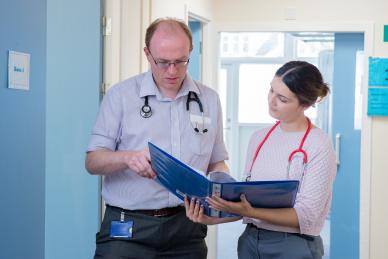Events
We host events on Gastroenterology and other related fields throughout the year. Visit our events programme to find out more.
Empowering medical excellence, shaping healthcare futures.
Opportunity to talk to patients about sensitive and embarrassing symptoms but which may have a profound effect on their day-to-day life
Long-term management of chronic conditions such as IBD
Practical dimension to specialty in the form of the endoscopy
Diverse caseload appeals to generalists but there is the opportunity for sub-specialisation if desired
Some view the general medical component and commitment throughout training as a downside
Dr Tom Lee - ST7.
"You get to deal with the gut, the most underrated and interesting organ."

Hands-on work
Still an expectation to dual accredit with general medicine unlike many cardiology trainees
You get to deal with the gut, the most underrated and interesting organ
The opportunity to prevent disease through bowel cancer screening or alcohol harm reduction programmes
Close working with surgical colleagues is essential
Spend ‘taster’ days with a gastroenterologist, both in a district general hospital and also at a tertiary referral centre to sample the full breadth of the specialty
Observe an endoscopy
Perform gastroenterology-relevant audits
Attend a gastro conference or College update
| 8:30am | 9:00am | Check on ward patients. |
| 9:00am | 1:00pm | General gastro clinic, see ten patients with conditions ranging from a patient with irritable bowel syndrome that stops them socialising or going to work, to a patient with a new diagnosis of pancreatic cancer. |
| 1:00pm | 2:00pm | Multi-disciplinary team (MDT) meeting, opportunity to discuss GI cases with radiologists, pathologists, surgeons and nurse specialists. |
| 2:00pm | Endoscopy list - four gastroscopies, one of which is a patient with haematemesis who has a bleeding ulcer that is treated endoscopically. Three colonoscopies including removal of a 2 cm precancerous colonic polyp. |


A diverse specialty encompassing the diagnosis and management of conditions ranging from luminal ones such as inflammatory bowel disease (IBD), gastrointestinal cancer or irritable bowel syndrome to liver disorders such as alcoholic liver disease. Endoscopy provides a practical, hands-on dimension.
A five-year programme, training takes place in a mix of district general hospitals and teaching hospitals. The usual aim is for dual accreditation with general medicine. It is possible to study sub-specialty areas of the curriculum in nutrition, IBD, hepatology and advanced endoscopy. Opportunities for research may allow a break in training.
Specialty Certificate Examination (Gastroenterology).
British Society for Gastroenterology
Listen to our Career Conversations podcast for our episode on Gastroenterology linked below.

We host events on Gastroenterology and other related fields throughout the year. Visit our events programme to find out more.